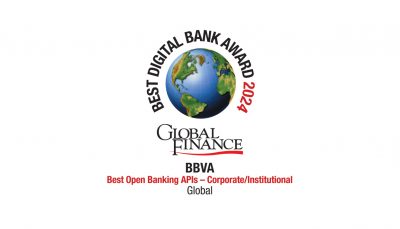You can see the original article here.
InnovaChallenge was a resounding success that opened new channels for financial institutions to interact with developers. BBVA is now launching Innova Challenge MX, a new contest with data from financial transactions of the main cities of Mexico.
“First know your core, then open it up.” These words come from Marco Bressan, Chairman & CEO at BBVA Data & Analytics, and could very well sum up BBVA´s bold approach to innovation.
Last year, in a bold and unorthodox move, BBVA opened access to a massive collection of anonymized transaction data from its clients. More than 140 teams from 19 different countries applied to use it during InnovaChallenge, a hackathon and contest organized by the institution to find the most interesting ideas and application of the massive dataset. The dataset represented a year of credit card activity from the cities of Madrid and Barcelona and was completely unlinked from any personal information.
In an industry as secretive as finance, the experience was almost unheard of. The data the client generates is one of the most treasured properties of a bank after, obviously, the money they deposit on their accounts. BBVA was the first bank in Spain and one of the firsts worldwide in granting such wide access to its internal transaction numbers.
The reason behind the move seems simple enough, and it is what lies behind the rise in popularity of the hackathon concept in recent years. The most innovative ideas do not always come from within the companies. Entrepreneurs and outside developers who are already building innovative projects usually have a fresh and original look on the challenges of the industry. “The results of the projects, in terms of quality and usability, showed the value that entrepreneurs and developers can bring when a big corporation embraces Innovation in a truly open manner adding value and engaging with the developer community through a win-win proposal” says Gustavo Vinacua, BBVA Innovation Centers & Open Innovation Director.
As Marco Bressan puts it: “The information on the financial interactions between people and their environment is an important part of any bank’s core but the capability banks have to capture value from this information is limited. We organized InnovaChallenge to understand if others could help us with this and the response was an overwhelming yes.”
Michele Trevisiol, a developer from Italy, was one of the winners of the 2013 InnovaChallenge. His service, Qkly is a travel planner that helps users avoid waiting in long lines in stores or for pay-services. The application used the aggregated data from BBVA to automatically predict overcrowding venues and point the users to the best times to visit different places. The application provides information on businesses, attractions or places based on user preferences.
Chances, developed by Alejandro Hernández from Spain, also managed to score one of the three top prizes. His application, aimed to future entrepreneurs, provides predictions on whether a business could be successful or not taking into account aspects such as location, customer types, seasonality and busy periods that can be extrapolated from BBVA’s dataset.
The third winner, BBVAPlaces, was also developed in Spain by Óscar Marín. It’s a tool that combines BBVA and Google Places APIs to analyze the correlation between the density of business places in a particular area and the number of transactions performed, as well as the ratings that users have given the business via social networks.
The success of the experience prompted BBVA Open Innovation to launch a second contest in 2014, InnovaChallenge MX. This time the data comprises cards processed at BBVA Bancomer point of sale terminals in Mexico City, Monterrey and Guadalajara from Nov. 1, 2013, to April 30, 2014. It’s a much larger dataset but, same as the first one, all the information is dissociated, irreversible and aggregated in order to preserve individual and business privacy.
The challenge has no technology requirements. Competitors can use any platform and programming language they want, but they should be compatible with the bank RESTful API. To get access to the API, BBVA hosts a developer portal that allows users to get the API keys and read the documentation. The deadline to submit applications is December 1.
InnovaChallenge MX has two award categories: applications for consumers and applications for businesses. Each category comes with three prizes: 15,000 euros for the winner; 10,000 euros for second place; and 5,000 euros for third place. If the project submitted has a real application at BBVA, the institution will contact its creator and examine how the application can be integrated within the organization but the intellectual property is always owned by the application’s creator and can be exploited commercially if they wish to do so.
In total, the contest will give away in total 60,000 euros in prize money to the most creative uses of BBVA’s data in combination with other sources. This is perhaps the most interesting side of this new challenge. Instead of relying only in the bank dataset, competitors are encouraged to use of a variety of big data sources and are given freedom to use any tools they like, as long as they are compatible with BBVA’s API.
Tying these datasets to worldwide contests is the perfect way to find the most creative approaches to transforming BBVA data into value but the plan does not stop there. In 2015, BBVA will open additional data and services outside of the competition. The vault will be open for any developer to see… and experiment with.
NO PURCHASE NECESSARY. Application period begins 10/6/2014. Registration period begins and data provided 10/20/2014. Application and Registration periods end 12/1/2014. Please visit bbvaopen4u.com for complete contest rules.

























